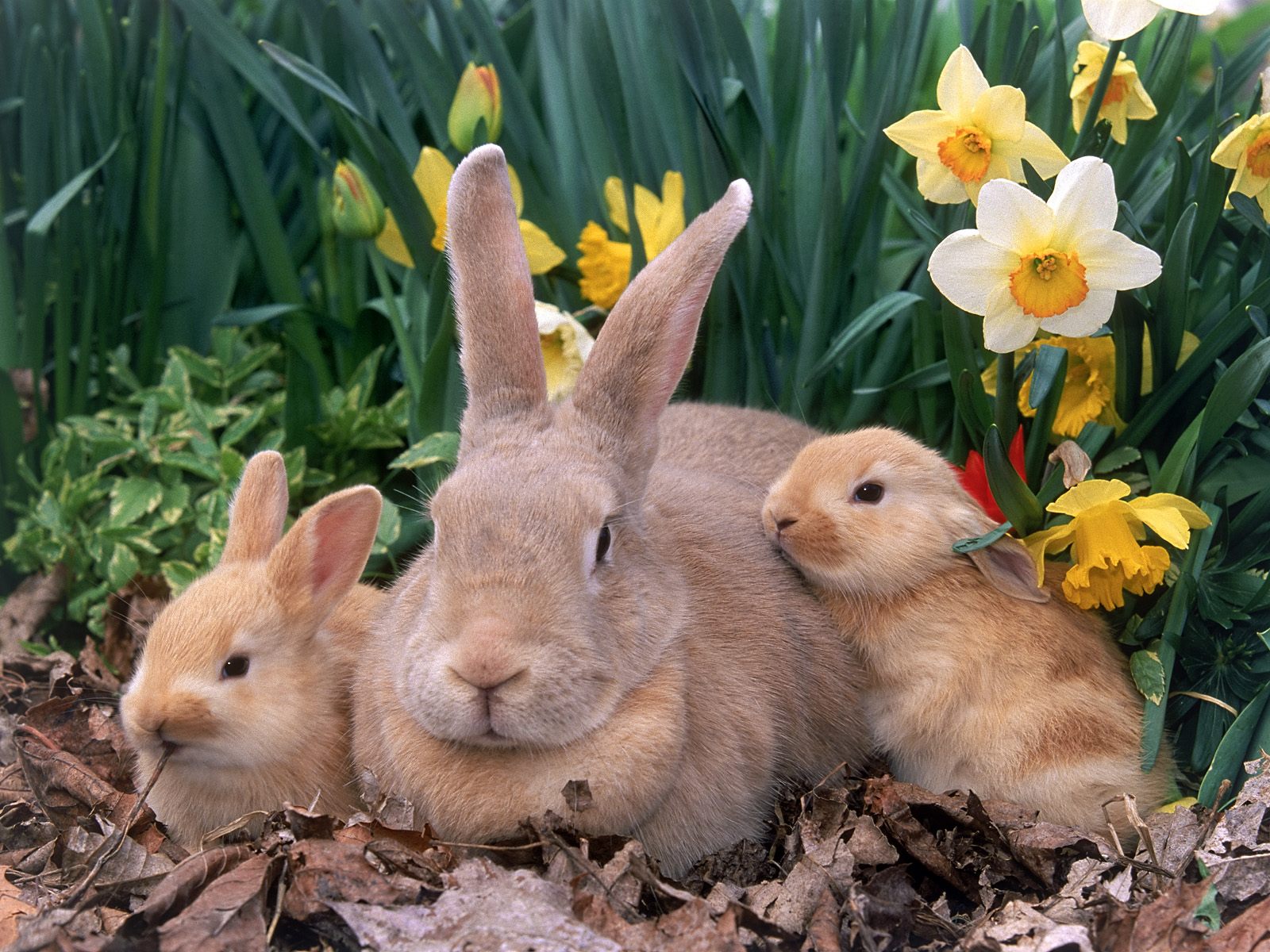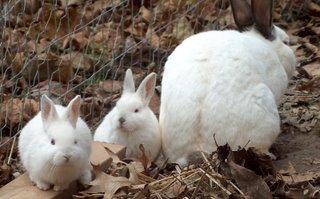Such Bright Eyes!
Rabbit
Hidden where the shadows cast
Hopping through the grass
Then running so fast
He came to home at last.

My Mother Looked Sad.
LATE one autumn I returned from the forest with a beautiful brown rabbit imprisoned in my box-trap. I conveyed" it home with
in exulting heart, in the buoyancy of
unreflecting boyhood, expecting
congratulation and the expression of
congenial joy from my loving and beloved
mother, in announcing the welcome tidings
of my success. Rare
pleasure would she share with me upon
exhibiting my innocent captive. I loved my
mother's smile; but as I hastened to relate
my achievement; how great was my
disappointment!
My mother looked sad. "My son, I
wish you had a taste for higher and better
pursuits," was her only reply.
Volumes were contained in these few
words, they indeed damped my spirits, and
sent pain to my heart; but they were words
of wisdom and love. They awakened the
sober, salutary thought that time was not
given me for selfish gratification or
unprofitable amusement, but for mental
and moral culture, and for the great ends
worthy of a rational being. They struck
deep into my memory and my conscience,
and often they revived, in a sober hour,
in future years, to check way
ward inclinations and to reprove and
restrain me when solicited by temptation
to devote time to ignoble objects.
What thanks shall I render to God for such
a mother? Many a child would have been
cheered with smiles and gratulatory words,
fanning the growing passion for the trap
and the gun. And what might have been the
moral influence of such treatment from my
own fond mother in that momentous period
of my life? I tremble at what might have
been the result. Self-indulgence I imagined
to be the source of happiness; and in this
delusive, ruinous sentiment I might have
been confirmed, to my utter undoing.
That scene is fresh before me; my mother
at her spinning-wheel the trap introduced,
despite the sobering words just spoken the
prisoner released in my inconsiderateness
to play in the room, as if this must gratify
her whom I so much loved, no less than
myself.
Poor victim! Few were his terrified leaps,
were he rushed into the open, blazing fire
upon the hearth, whence he was taken
with the tongs by my distressed mother,
and dispatched in haste to end his pains.
Then too, I was sad; for I had brought to a
miserable death the innocent animal; and
all my promised pleasure had vanished,
like the smoke of the fire into which my
captive had vainly hurried for safety.
Then and there I learned the lesson, never
to be forgotten, that the pursuit of mere
pleasure at the expense of the happiness
and life of the inferior, harmless creatures
around us is irrational and criminal. It was
time to have higher aims, and to inspire
nobler objects. This was seen and felt by
one who loved me more wisely than I loved
myself, and whose fervent desire and
prayers were, that my happiness might be
found in the fear, love, and service, of God.
She well knew that a heart unrenewed and
devoid of Christian affection could not be
the abode of joy or peace, which will abide
through the changes of time, and survive
the sorrows of earth and the solemnities of
death and the grave.
Mother's Treasury.

"Here are two little brothers out for their early morning run in the dew and the sunshine. They live and learn in the School of the Woods. Did you not know that little animals had to go to school? They have many lessons to learn, and their mothers are their teachers. Those poor little animals who have lost their mothers have no one to teach them. They are soon caught and killed by some larger animal or bird, because they have not learned the way to escape.
The first and chief lesson for Baby Bunnies to learn; as well as for little children, is to obey their mothers,-to do as they are told. Baby Bunny knows nothing. His wise Mamma knows all that a bunny needs to know. So if he does just what she tells him, he will be safe. But the naughty and disobedient little bunny will be sure to get into trouble.
Baby Bunny learns to lie quite still when a snake or hawk is near. Then most likely he will not be seen. He learns how to dodge the old fox and the dogs who chase him, and to lead them into the prickly thorn bushes that scratch them and shelter him.
He learns how to send telegraph messages to the other bunnies with his hind feet. One thump means "Keep still." Two slow thumps mean "Come." Two fast thumps mean "Danger." And three fast thumps mean "Run." These are a few of the lessons that Baby Bunny learns in the School of the Woods."
June 18, 1903 EJW, PTUK 395
THE LITTLE HARE.
THE hare is very much like the rabbit. It is a little larger, and is known by a black spot at the tip of its ears. It does not burrow in the ground as rabbits do, but makes its nest, or
"form" as it is called, in the grass. It is very timid.- In England rich men hunt it, for sport, with dogs and horses. It is hard to understand how grown-up men can take pleasure in
hunting down a poor timid hare. It is cruel and senseless sport. We trust that no boy in the family ever hurts an animal for pleasure or mere sport.
Beyond the palings of the park,
A hare had made her form
Beneath a drooping fern, that gave
A shelter, snug and warm.
She slept until the daylight came,
And all things were awake;
And then the hare, with noiseless step,
Crept softly from the brake.
She stroked her whiskers with her paws,
Looked timidly around
With open eyes, and ears erect
That caught the smallest sound.
The field-mouse rustled In the grass,
The squirrel in the trees;
But the little hare was not afraid
Of common sounds like these.
She frisked and gamboled with delight,
And cropped a leaf or two
Of clover and of tender grass,
That glistened in the dew.
What was it, then, that made her start,
And run away so fast?
She heard the distant sound of hounds,
She heard the huntsman's blast.
Hoy! tally-ho I hoy! tally-ho!
The hounds are in full cry;
Ehew! ehew! in scarlet coats
The men are sweeping by.
So off she set with a spring and a bound,
Over the meadows and open ground,
Faster than hunter and faster than hound;
And on, and on, till she lost the sound,
And away went the little hare.
THE RABBIT.
Rabbit is the name commonly given to several species of the hare family.
The pretty little creatures are found in almost ever part of the world, although they are said to be natives of Spain.
They are of many different colors and shades, black, brown, gray, white, spotted, etc.
Rabbits build their nests in the ground, usually in meadows, but sometimes
they are found in cultivated fields at the foot of a hill of corn, or some other plant that will afford them shelter. A few days ago a nest of young rabbits was plowed out from under a hill of sage in the middle of the field. There were four of the little fellows snugly hid away in a nest made of light brushwood, and lined with thistledown. They were so young that their eyes were not yet open, and it seemed sad to give them so rude an introduction to the ways of the world; but after replacing the nest as carefully as possible, and marking the spot so as not to disturb it again, we found them all right and able to run about, on visiting them a few days later.
During the summer and autumn months, when there is plenty of clover, the rabbits fare pretty well, and they are somewhat shy of the farm buildings; but when the fields have all been cleared, they venture into the orchards and gardens, where they feed on the apples, and the leaves of the garden vegetables. They are especially fond of cabbage.
Although the rabbit is a very harmless-appearing animal, yet he sometimes
does a great deal of mischief.
In the winter, when the snow is deep and he can find nothing to eat, he
gnaws the bark from the young fruit trees, frequently destroying an entire orchard.
The rabbit is a very timid creature, and is usually so wild that the comparison "wild as a hare" has come to be a common one. When tamed, however, it often comes to be a very affectionate little pet. The poet Cowper, who lived in England about one hundred years ago, had a pair of them of which he was very fond; and as he lived alone most of the time, his rabbits were a real comfort to him.
He is said to have spent several hours a day with them, feeding them and
watching their pretty gambols; and when one of his pets died, he wrote a pretty little poem about it. This certainly shows the poet to have been a very kind-hearted man.
In these mild October days, when the summer's work is done, and everything snugly stored away for winter, or later on, when the first light snow has fallen, the farmer lads like to get together and go hunting the rabbit and other small game. Of course this is fun for the boys, but I fear the tenderhearted poet would feel like reproving them for killing his pretty pets. And really, boys, does it not make you hard-hearted to find your sport in destroying life? Did you ever think that perhaps life was as dear to the little rabbit as to you?
Think of it next time the one you are chasing looks at you so appealingly out of its great, frightened eyes, and see if you cannot find better sport.
B. L.